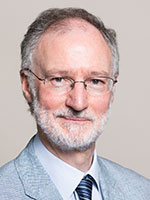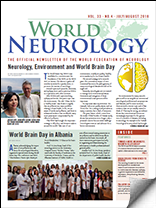By David Oliver
There is increasing awareness of the role of palliative care for neurological patients, and this has been emphasized at two recent conferences.

David Oliver
At the Fourth Congress of the European Academy of Neurology in Lisbon, there was a European Association for Palliative Care / EAN Symposium on Palliative Care and Neurology as part of the program. Over 100 people attended.
During the session, Prof. Raymond Voltz, Dr. Simone Veronese, and Prof. David Oliver spoke on developments within the field. The importance for all neurologists to provide a palliative care approach and to collaborate with specialist palliative care was emphasized, as has been emphasized in the EAN / EAPC Consensus on palliative care and neurology. There was good feedback, and several members of the audience discussed the issues afterward.
Within the same congress, there was a case-based workshop on end-of-life care for the neurological patient, looking at the use of interventions such as gastrostomy or ventilation at the end of life, coping with difficult patient and family situations, and how to be involved in difficult conversations. Prof. Oliver also spoke at a scientific theater, a presentation within the poster and exhibition area,on the Consensus document on palliative care and neurology.
The 15th International Congress on Neuromuscular Disease (ICNMD) was held in Vienna in early July. Over 1,400 delegates from 69 countries attended the meeting, which was held in collaboration with the European Federation of Autonomic Societies (EFAS).
Palliative care was included within the program, and the workshop on palliative care was attended by over 40 people who heard about the role of palliative care for neurological patients, the effectiveness of multidisciplinary care approach, the recognition of end of life care, and the experience of an ALS team in Moscow, Russia, in developing a clinic and increasing the availability of both palliative care and morphine use in symptom management.
Prof. Oliver, who is co-chair of the EAN Palliative Care Specialty Panel and chair of the EAPC Reference Group on palliative care and neurology, spoke in two other sessions. There was an “overarching session” on dysphagia, and he spoke on the ethical challenges of the management of dysphagia, including the assessment, use of interventions, discussions with patient and families and consideration of care at the end of life, including the consideration of withdrawal of treatment. The session allowed a wider discussion of the issues of dysphagia, which may affect many with neuromuscular disease.
Palliative care also was featured in a plenary session on motor neurone disease. Prof. Oliver discussed the ethical issues in the management of motor neurone disease, discussing the telling of the diagnosis, the issues of genetics, cognitive change, nutritional support, ventilator support, and end-of-life issues. The session was a new development at the congress with palliative care being discussed in the large plenary session, with over 500 people attending.
This was a wonderful opportunity to introduce palliative care and ethical discussions into the care of people with neuromuscular diseases. We are very grateful to Prof. Wolfgang Grissold, the chair of the ICNMD Scientific Committee and the organizers, for facilitating these opportunities to present at this congress. •
Further Information
Oliver DJ, Borasio GD, Caraceni A, de Visser M, Grisold W, Lorenzl S, Veronese S, Voltz R. A consensus review on the development of palliative care for patients with chronic and progressive neurological disease. Eur J Neurol 2016; doi:10.1111/ene.12889
Prof. David Oliver is honorary professor at the University of Kent, an EAPC board member, and chair of Reference Group on Neurology and Palliative Care.
